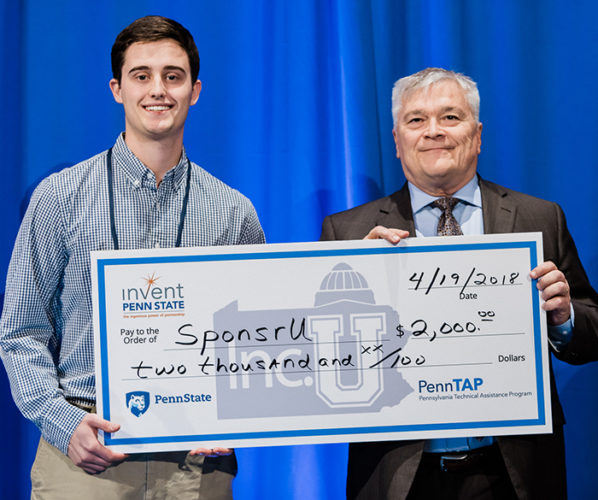Success Story
Penn State Student Startup SponsrU Tackles Student Debt with Crowdfunding Platform
The United States has record student loan debt with over $1.5 trillion in outstanding loans, a number that is still growing. Penn State startup SponsrU wants to help students by providing an online solution that to reduce student loan debt through personal mentorship, employee benefits, and performance incentives.
After SponsrU’s founding in 2017, Penn State Alum James “Jimmie” Aversa, a student at the time, entered PennTAP’s Inc.U competition, which led to Jimmie pitching SponsrU at the 2018 Invent Penn State Venture and IP Conference. Since then SponsrU has received outside investment and is in the midst of an angel fundraising round.
“Inc.U was an incredible opportunity to grow as a founder,” says Jimmie. “I was as well prepared as I could possibly be, but still nowhere near ready for investment at that point. I didn’t realize that at the time, but that’s is indicative of how my experience as an entrepreneur has been this entire time. As soon as I think I’ve got it all figured out, I get punched square in the face and can’t see out of my left eye for a few weeks.”
Crowdfunding isn’t new, but it has become a modern online phenomenon. For example, Kickstarter, a crowdfunding platform for businesses, has helped 151,727 projects get funding with pledges totaling more than $3.9 billion. Gofundme, another popular crowdfunding platform to help people in financial crisis, has received more than $5 billion from 50 million donors across 2 million Gofundme campaigns.
How funds are disbursed once a project is funded varies from platform to platform. Some crowdfunding services release the funds to the project founder without any assurances anything will come out of it. Many crowdfunding projects have become vaporware despite raising millions. Other platforms release the funds to founders as soon as they come in. This is a good way to help people quick, but there’s still no way to ensure the money is used as intended.
SponsrU addresses the accountability problem by requiring campaigns to set goals and decide on measurable outcomes that their mentors (donors) can track. If a mentor likes the goals, they can start supporting the student, but if the student stops meeting their milestones, the mentor can cut end their assistance. This accountability helps improve outcomes and satisfaction for everyone involved. The system also can be adapted for businesses and organizations that want to set goals and milestones to incentivize employees and members with bonuses or extra time off.
Jimmie graduated from Penn State this spring and feels strongly about Invent Penn State and what the entrepreneurial mindset can bring to Penn State. “I love it. I can see clearly that President Barron has real passion when it comes to fostering entrepreneurship in the community. The road to creating a culture that supports entrepreneurship will always be rocky because entrepreneurship is still foreign to so many people. But when I see the passion in President Barron’s eyes and that same passion in my former professors and the entrepreneurship community at large, I can’t help but feel excitement for the future student who will achieve their dreams because of that passion.”
SponsrU has been operating for over a year and they’ve spent that time developing the core features of their product and building their marketing and strategy foundation. Now the team is moving into a round of angel funding where they plan to focus their resources on design and marketing.
“If we break up tech startups into phases like we learn in a textbook as students, there are five phases I use to break down every tech startup: ideation, proving, traction, growth, and exit. In my mind, SponsrU is on the tail end of the proving phase. Every company has a different timeline for each phase and for us, the proving stage has been long and painstaking. I’m hoping being a founder gets easier as we go, but I don’t think that will be the case,” Jimmie says with a laugh.






